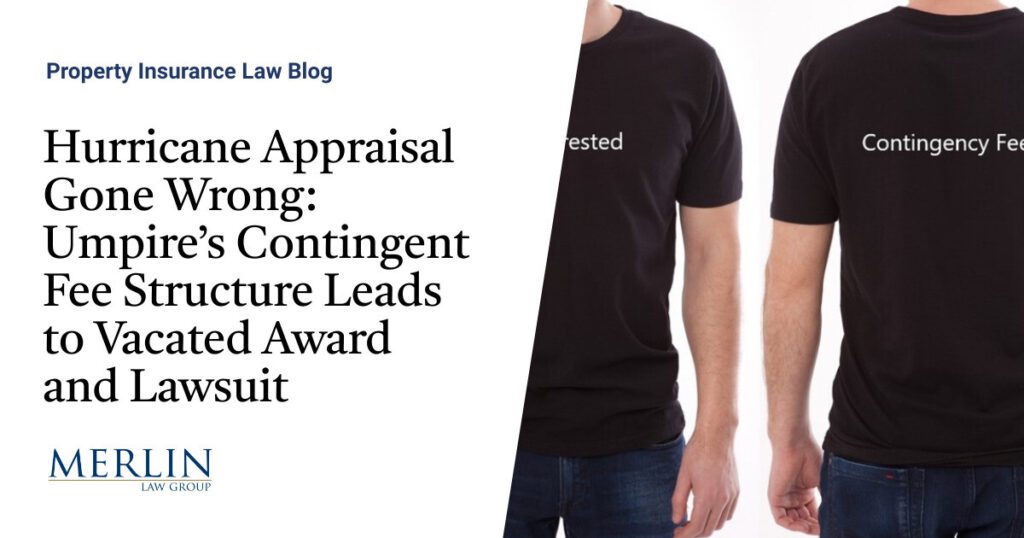Hurricane Appraisal Gone Wrong: Umpire’s Contingent Fee Structure Leads to Vacated Award and Lawsuit

A recent lawsuit filed in Lee County, Florida, highlights a cautionary tale about appraisal umpire compensation that resulted in a vacated award and significant financial consequences for all parties involved. The case of Estero Beach and Tennis Club v. Riteway Insurance Repair Service, and Gustavo Marrero demonstrates how an umpire’s decision to change his fee structure led to the invalidation of a $10.2 million replacement cost value award. 1
Following Hurricane Irma damage, Estero Beach and Tennis Club engaged in an appraisal with American Coastal Insurance Company (ACIC). Gustavo Marrero was selected as the umpire, initially providing a fee schedule that specified a flat rate of $3,000 for the first ten hours and $300 per hour after that. Instead of following his own fee schedule, Marrero made a fateful decision to calculate his fee as 2% of the appraisal award. He further allowed an estimator he hired to charge based on a contingency fee of 0.75% of the award. Per the allegations in the complaint, Marrero then created an after-the-fact activity log to justify the percentage-based billing.
The umpire’s decision had severe repercussions:
The original appraisal award of $10.2 million RCV was vacated
A second appraisal resulted in a dramatically lower award of $1.7 million RCV
The policyholder had to return $1.49 million to ACIC
All expenses and time spent from the first year-long appraisal were wasted
I have been told that before the second appraisal award, Hurricane Ian struck the condominium. The insurance company paid a contractor to repair many of the claimed damages. The second award cannot fully be compared to what was being claimed in the first award because the scope of damages that the second panel considered was much less.
Estero Beach has now filed suit against both Marrero and Riteway Insurance Repair Service, alleging negligence. The complaint argues that Marrero breached his duty to be impartial by implementing a contingency fee arrangement that tied his compensation to the award amount.
This case provides several crucial lessons for appraisal umpires:
Stick to Agreed Fee Structures: Once a fee schedule is provided, maintain strict adherence to it. Any changes should be discussed and agreed upon by all parties in writing.
Maintain Detailed Time Records: Umpires must keep accurate, contemporaneous records of their time and activities.
No Percentage-Based Fees: Contingency or percentage-based fees create an appearance of impropriety and can invalidate the entire appraisal process.
Disclose, Get Approval for and Monitor Vendor Compensation: Ensure that any retained experts or consultants are disclosed, approved of and maintain appropriate fee structures that don’t tie compensation to the award amount.
Steve Badger and I may debate numerous subtle issues regarding appraisal. There is no debate about this situation. All states call for an umpire to be neutral and not charge a fee based on a contingent or percentage amount.
The consequences of this case extend beyond the immediate parties. This case serves as a sobering reminder that even the simple act of maintaining hourly billing and proper documentation would have avoided this entire situation. Instead, a deserving policyholder and umpire are now engaged in costly litigation that could have been prevented through basic professional practices and accepted standards within the appraisal industry.
For the appraisal community, this case should prompt a review of fee arrangements and billing practices. The integrity of the appraisal process depends on maintaining strict impartiality, and that includes ensuring that compensation structures don’t create actual or apparent conflicts of interest.
The most tragic aspect of this case is its preventability. Had the umpire simply followed his original fee schedule and maintained proper time records, both he and the policyholder would have avoided significant financial and legal complications. This serves as a reminder that in the appraisal process, adherence to established professional practices isn’t just about compliance – it’s about protecting all parties involved and maintaining the integrity of the insurance claims resolution process. Appraisal can only work if both parties agree that they had a fair and honest opportunity, even if the panel eventually agreed or disagreed with their position.
Thought For The Day
Without accountability, there is no trust, and without trust, there is no leadership.
—Dave Ramsey
1 Estero Beach and Tennis Club v. Riteway Ins. Repair Service, No. 24-CA-006687 (Fla. Cir. Ct. (Lee) Oct. 1, 2024).



